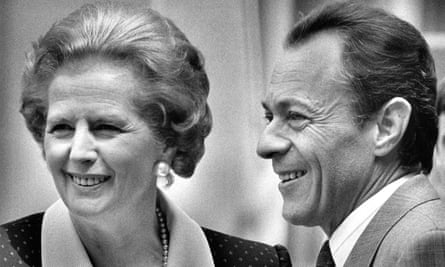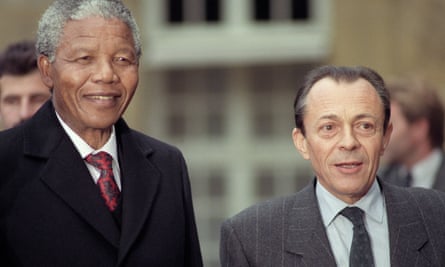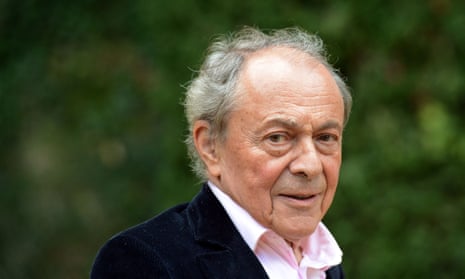In the autumn of 1980, a meeting took place between François Mitterrand and his socialist rival, Michel Rocard, both of whom were jockeying to be the Socialist presidential candidate at the forthcoming elections. Mitterrand subsequently recounted the rendezvous to his aide Jacques Attali: “As I was bored listening to him, I began to play with a piece of paper which I rolled into a ball. It fell on the floor between the two of us, and can you imagine: he got on all fours to pick it up and give it to me.”
Whether or not this story is true, it encapsulates perfectly the relationship between the two men: Rocard, who has died aged 85, the eager challenger without the killer instinct; Mitterrand the cool and Olympian political operator with an uncanny sense of the weaknesses of his opponents. Rocard was the most brilliant and attractive socialist politician of the post-second world war period; Mitterrand his implacable nemesis.
Born in Courbevoie, a western suburb of Paris, Michel was the son of Yves and Renée (nee Favre), a teacher. Yves was a distinguished nuclear physicist, an austere intellectual whose remoteness was accentuated by deafness (he was allegedly one of the models of Hergé’s eccentric Professor Calculus in the Tintin books). Michel craved his approval, but found it difficult to win – Yves disliked Michel’s decision to study social sciences rather than the hard sciences. The family was Protestant and Michel was driven by the strong ethical imperative characteristic of French protestantism.

While studying at the Ecole des Sciences Politiques and then the elite Ecole Nationale d’Administration, Rocard threw himself into socialist student politics. From 1958 he was a financial civil servant, at the same time continuing his activism, becoming a bitter opponent of the government of the socialist Guy Mollet (with Mitterrand as interior minister) for its pursuit of colonial war in Algeria. In 1960 Rocard joined the small dissident Unified Socialist party (Parti Socialiste Unifié, known as the PSU), and rose to become its leader (1967-73). In 1969 Rocard stood as the PSU’s candidate at the elections, scoring 3.6% of the vote.
By now he was a figure with a national profile, but found himself out of tune with the recomposition of the left under Mitterrand, who had taken over the moribund Socialist party. Mitterrand’s strategy involved an alliance with the powerful Communist party. The price of this alliance was the adoption of a Marxist-inspired programme of nationalisation and public spending, which Rocard believed was economically naive. But the political wind was behind this strategy and Rocard joined Mitterrand’s party in 1974.
He was an important recruit, but equally Mitterrand harboured an understandable suspicion of him. When the left was defeated at the parliamentary elections of 1978, Rocard hoped his time had come. Attacking what he called the “archaism” of the Socialist leaders, he developed his vision of what he called the “second left” – a left committed to decentralisation and ready to draw on civil society rather than relying on state control and top-down reforms.

One of his obsessions was to educate the left into economic realities. Where Mitterrand’s culture was historical and literary, Rocard’s was economic and sociological; where Mitterrand’s ambition was to win power, Rocard’s was to reflect on what to do with that power.
At the Socialist congress in Metz in 1978, Rocard was outmanoeuvred by Mitterrand’s supporters. When Rocard tried to suggest that the current policies of the left would lead to austerity and exchange controls, he was put down by Mitterrand’s sidekick Laurent Fabius with the demagogic phrase: “Yes, Michel, there is something between the market and rationing – it is socialism.”
This succeeded in making Rocard seem to be a rightwing figure, which was only true according to a particular definition of the left. Rocard was essentially trying to educate the party to move from incantatory Marxism to social democracy. Polls at this time showed Rocard to be the most popular Socialist politician in France, but Mitterrand controlled the party and it was he who was selected as the party's presidential candidate. After Mitterrand won the presidential election of 1981, he sidelined Rocard into a ministry, planning and regional development, where he had little real power.
Over the first two years of Mitterrand’s presidency, almost all that Rocard had predicted came to pass: three devaluations, a huge increase in the balance of payments deficit, the imposition of exchange controls and a wage freeze. Mitterrand was forced to backtrack. Rocard’s political stock rose, and in 1983 he was given the post of agriculture minister.
He later said that this was one of the periods he had most enjoyed, restoring relationships with the farming groups who had been alienated by his predecessor, the abrasive Edith Cresson. Then, suddenly, Rocard resigned in April 1985, scandalised by Mitterrand’s cynical decision to introduce proportional representation in the following year’s parliamentary elections. Mitterrand’s aim in doing this was to divide the right by allowing the extremist Front National to win seats.
Rocard threw his hat in the ring to be the Socialist candidate for the presidency if the ageing Mitterrand decided not to stand again. When Mitterrand made it clear he had every intention of doing so, Rocard had to withdraw his candidature. After Mitterrand’s re-election in 1988, he appointed Rocard as prime minister. The parliamentary elections that followed the presidential election did not give the Socialists an overall majority, and Rocard seemed the person likeliest to rally the support of centrists to the government.
As premier, Rocard did have some notable successes: he managed to reconcile the highly antagonistic communities in the French territory of New Caledonia; he organised a reform of the financing of the indebted social security budget; and he introduced a minimum living wage income (Revenu Minimum d’Insertion) for those on very low incomes. These were valuable incremental reforms, but Rocard did not entirely succeed in giving an overall sense of direction as premier.
This was partly because Mitterrand, as president, did all he could to undermine him. When Rocard had taken over, the outgoing premier, Jacques Chirac, told him: “Beware of Mitterrand, it is when he smiles at you that the dagger is close to your back.” This was indeed the case, though for Rocard there were in fact few smiles.
Mitterrand sacked Rocard in May 1991. It was probably no bad thing to be disassociated from the increasingly discredited Mitterrand, and Rocard began to position himself for the future. With disaster looming for the Socialists at the forthcoming elections, Rocard called for a “big bang” on the left to create a new force incorporating the centre, the Greens and the Socialists. The predicted electoral disaster occurred and Rocard got himself elected to the leadership of the Socialist party. But this was to be a short-lived success.
Although under his leadership the party did start to rise in the polls, he made the mistake of heading the party’s list at the European elections of 1994. The Socialists did very badly, partly because Mitterrand had covertly supported a rival centre-left list in order to undermine Rocard. After this debacle, Rocard was ousted from the leadership of the party and decided to distance himself from French politics, resigning even the post of mayor of Conflans-Sainte-Honorine, a north-western suburb of Paris, which he had held since 1977. From this moment, he devoted himself to his activities as a member of the European parliament, where he remained until 2009.
Rocard was a genuine political visionary and the French Socialist party would be in a better state today had he been listened to earlier. He was an economic realist with a moral vision, but it was France’s bad luck that he did not have the political adeptness to put his vision into practice. Segolène Royal’s election campaign in 2007 was a half-baked attempt to embody some of the intuitions Rocard had had 20 years earlier, but without the intellectual substance that Rocard had tried to give them. It was somehow typical, however, that Rocard’s intervention in the first round of the campaign, calling on Royal to form an alliance with the centrist candidate François Bayrou, was ill-timed and did her cause no good. Rocard was unfortunately never the most effective tactical advocate of the ideas he defended.
With his first wife, Geneviève Pujol, he had two children, Sylvie and Francis. In 1972 he married Michèle Legendre, and they had two sons, Olivier and Loïc. His first two marriages ended in divorce. He is survived by his third wife, Sylvie Pélissier, and his children.
Julian Jackson
David Owen writes: Michel Rocard was my friend of the heart and the brain for 50 years. We agreed on a social democracy for the 21st century. We believed in Europe as an enriching entity in all its many manifestations. For him Europe would be a supranational political design, for me a grouping of states. On that difference there were many arguments along the lines of his June 2014 Guardian article, A French message to Britain: get out of Europe before you wreck it.
In Paris this spring we spoke in unison on a European Movement political platform at the start of the British referendum campaign. The time had come for the EU and the eurozone to be a United States of Europe and for Britain to leave the EU, but with the friendship between our two countries enhanced by that process. I am glad that he lived to see that British decision. I mourn the loss of a great Frenchman and fine internationalist.

Comments (…)
Sign in or create your Guardian account to join the discussion